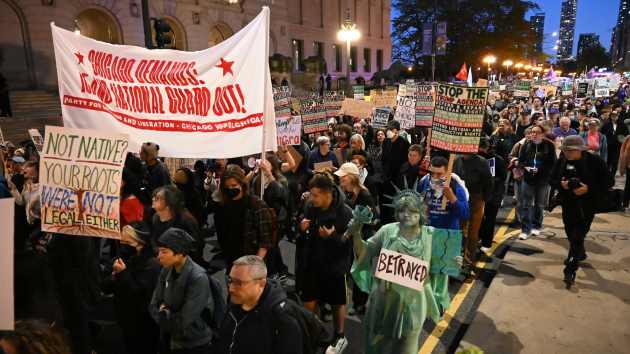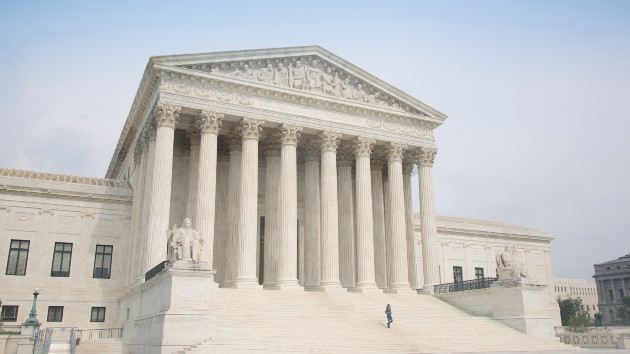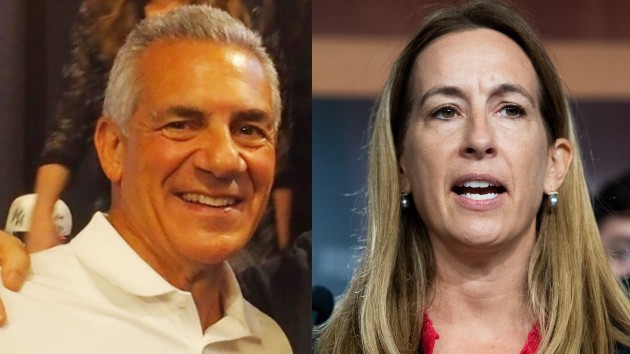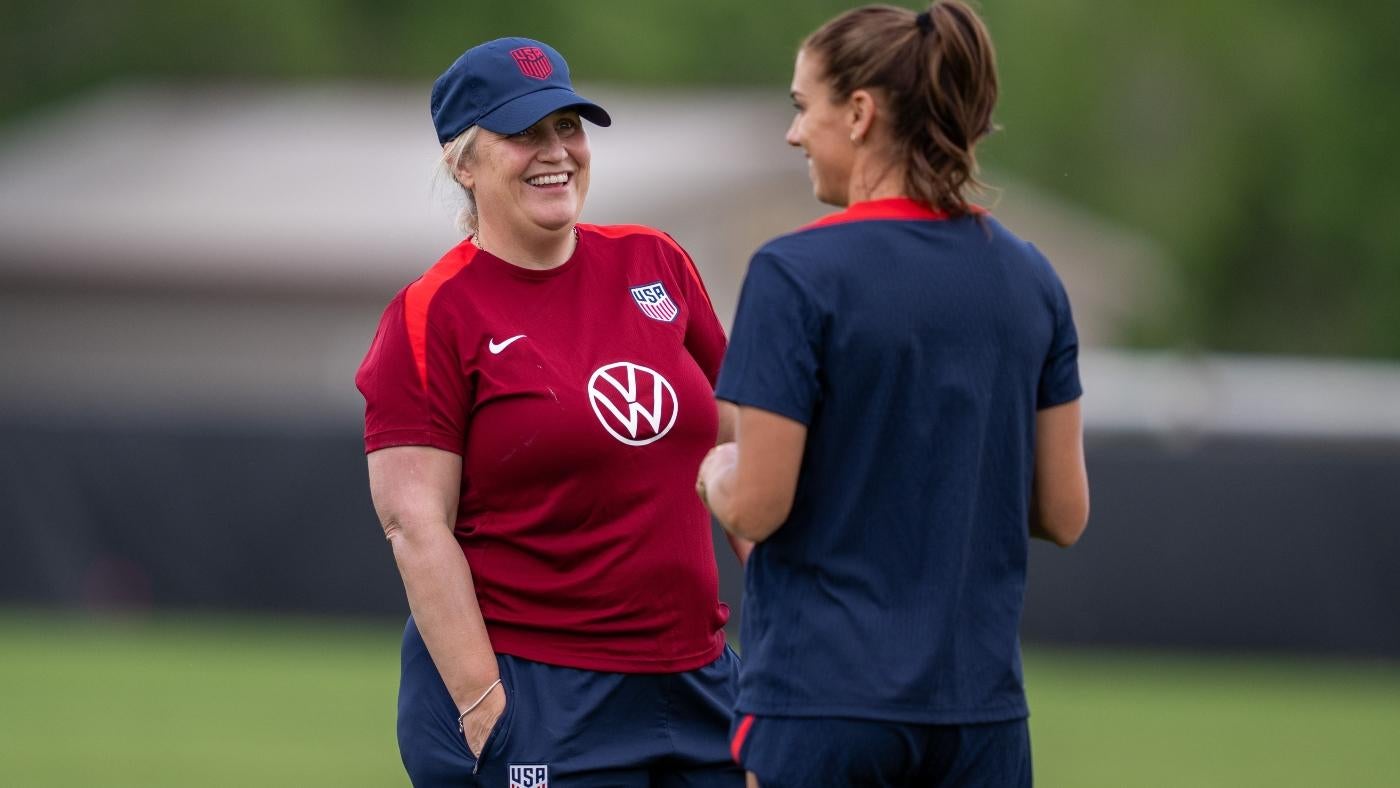Donald Trump becomes first US president tried and convicted of crimes
Written by ABC Audio ALL RIGHTS RESERVED on May 31, 2024

(NEW YORK) — Donald Trump, the second-generation New York business mogul who led one of the most consequential right-wing populist movements and changed the face of presidential politics, was found guilty of 34 felonies in his home city Thursday, becoming the first president in American history to be criminally convicted.
It took the jury 10 hours to come to their decision.
Trump, who was impeached twice while in office, faced four indictments as he geared up for the 2024 race. The case in Manhattan dealt with a hush money payment to a porn star and his attempt to hid salacious information from voters to boost his electoral prospects in the 2016 presidential election.
The former president pleaded not guilty and denied all wrongdoing. After the verdict was read, Trump railed against the judge, and called the trial “rigged [and] disgraceful.”
“The real verdict is going to be November 5, by the people, and they know what happened here and everybody knows what happened here,” Trump said to hallway cameras after angrily exiting the courtroom following his conviction.
Sentencing is scheduled for July 11, four days before the Republican National Convention.
Manhattan District Attorney Alvin Bragg commended the jury Thursday for their work in the historic case.
“While this defendant may be unlike any other in American history, we arrived at this trial and ultimately today at this verdict in the same manner as every other case that comes to the courtroom doors by following the facts and the law, and doing so without fear or favor,” he said at a news conference later in the evening.
The verdict caps a yearslong legal saga that began not too long after Trump declared presidential run in 2015.
The ‘catch and kill’ deal that started it all
In August 2015, National Enquirer publisher David Pecker testified that he met with Donald Trump and Michael Cohen in Trump Tower to discuss how his “magazines could do to help the campaign.”
Pecker told jurors that he agreed to serve as the “eyes and ears” of Trump’s presidential campaign by identifying negative stories about Trump related to women.
“The entire purpose of this meeting at Trump Tower was…to manipulate and defraud the voters, to pull the wool over their eyes in a coordinated fashion,” Manhattan prosecutor Joshua Steinglass told jurors during his closing statement about the alleged scheme.
To honor his agreement, Pecker testified that his company caught and killed two stories to help the campaign – paying $30,000 to a former Trump property doorman who falsely alleged that Trump had a child out of wedlock and $150,000 to Karen McDougal, who alleged a months-long affair with Trump, – an alleged affair the former president has long denied.
In October 2016, Pecker also flagged to Michael Cohen that adult film actress Stormy Daniels was shopping a story of her 2006 alleged sexual encounter with Trump, though Pecker declined to buy the story himself.
Michael Cohen testified that he brought the story directly to Trump – speaking with the then-Republican nominee nearly two dozen times in the month ahead of the election – and ultimately paid for the story out of his own pocket on Trump’s orders.
Trump later reimbursed Cohen in 2017 by making a series of $35,000 payments, labeled in business records as legal expenses pursuant to a retainer agreement.
Prosecutors alleged that Trump’s description of the payments disguised their true purpose so voters would never learn about the hush-money payment, though a 2018 Wall Street Journal report uncovered the payment.
“Of course, we will never know if this effort to hoodwink the American voter made the difference in the 2016 election, but that’s not something we have to prove,” Steinglass said. “The point is that the reimbursement to Cohen was cloaked in false business records to hide the conspiracy.”
A long road to indictment
When Special Counsel Robert S. Mueller III was conducting his investigation into allegations of Russian interference in the 2016 election, his office referred Trump’s lawyer Michael Cohen to federal prosecutors in New York’s Southern District.
It remains unclear what exactly prompted the referral, but by April 2018, the FBI had raided Cohen’s office, hotel room, and home. In August of that year, Cohen pleaded guilty to skirting campaign rules when he made payments to Daniels and McDougal.
The plea deal was seen as a major shock as Cohen has dutifully stood by Trump for years through numerous scandals and legal quandaries.
Trump himself was referenced in Cohen’s indictment as “Individual-1” who directed him to make the payments, but federal prosecutors opted to not charge Trump due to a longstanding guidance against indicting sitting presidents.
When Trump left office, prosecutors never reopened their investigation or brought charges against the former president. Next door from the federal prosecutors, Manhattan District Attorney Cy Vance Jr. – who had begun investigating Trump’s hush money payments in 2018 – opted to continue the investigation.
By 2021, Vance authorized his prosecutors to pursue a criminal indictment based on Trump’s exaggeration of his net worth. That investigation was ongoing when Vance left office, leaving the decision to his successor Alvin Bragg.
Bragg, however, determined that the case “wasn’t ready for takeoff,” prompting the resignation of two top prosecutors.
At the time, the case appeared dead in the water, but Bragg shook up his legal team and found success in the prosecution of the Trump Organization for a 15-year tax fraud scheme and a guilty plea from Trump Organization CFO Allen Weisselberg. By 2023, a new case theory centered on the testimony of Michael Cohen emerged, and prosecutors successfully convinced a grand jury to indict the former president.
In April 2023, Trump became the first current or former president to be criminally indicted. He pleaded not guilty to 34 felony charges of falsifying business records stemming from his hush payment to Daniels.
The New York indictment became the first of four criminal cases against the former president. The other cases relate to his alleged conduct during the 2020 election and how he dealt with classified documents. He has pleaded not guilty in those cases and denies the charges.
Trump’s past takes center stage
After months of back and forth, including multiple attempts by Trump’s attorneys to have the case dismissed or delay the case, the trial began on April 15.
Prosecutors called 20 witnesses – including some of Trump’s closest advisors and deputies – to try to prove their case against the former president.
Prosecutors first called Pecker, who went into detail about the catch-and-kill agreement he made with Trump and Cohen during and after the 2016 campaign.
The former publisher also described how after securing the presidency, Trump kept tabs on the women he and Cohen had paid off.
Rhona Graff, Trump’s longtime assistant, testified that she recalled seeing Daniels in the reception of the executive floor of Trump Tower.
Daniels would eventually take the stand, coming face to face with the former president for the first time in over a decade, and recounted their alleged sexual encounter, which Trump continues to deny.
“I told very few people that we had actually had sex because I felt ashamed that I didn’t stop it, that I didn’t say no,” Daniels told jurors.
Trump attorney Susan Necheles got into a heated cross-examination with Daniels questioning the validity of her claims and arguing she was making it up to extort money from Trump.
“You have a lot of experience of making phony stories about sex appear to be real?” Necheles asked.
“The sex in the films is very real, just like what happened to me in that room,” she said on the stand.
Things got even more heated when prosecutors concluded their their case by calling Cohen himself.
Cohen contended that Trump ordered him to “just do it,” referring to the payoff during the end of the campaign, as word of the alleged affair with Daniels would have been “catastrophic.”
“He stated to me that he had spoken to some friends, some individuals, very smart people. It’s $130,000. Just pay it,” Cohen testified.
Defense attorney Todd Blanche launched an attack on Cohen’s credibility noting his previous perjury convictions and lies to the press.
Specifically, he accused Cohen of lying about a phone call he said he had with Donald Trump on Oct. 24, 2016, showing phone records that indicated Cohen called Trump’s bodyguard.
Defense lawyers presented evidence that Cohen actually made the call to complain to Trump’s bodyguard about a teenage prank caller.
Cohen, who remained calm during his time on the stand, stood by his testimony and said the bodyguard gave the phone to Trump.
Trump chose not to take the stand in his own defense, however, he was very vocal as the trial unfolded.
Drama inside and outside the court
Ever since the indictment was handed down to him, Trump repeatedly lashed out against key players in the case – including Cohen, Daniels, Bragg and Judge Juan Merchan, the judge presiding over the case – to the press during rallies and on social media.
Trump’s frequent attacks ultimately prompted the Merchan to issue a limited gag order prohibiting Trump from making public comments about the witnesses, jury, and family of Bragg or Merchan.
During the trial, Merchan found Trump in criminal contempt ten times for Trump’s repeated violations of the gag order, threatening to imprison the former president for future violations.
Cohen would also slam Trump on social media and his podcast before and during the trial despite being a key witness set to take the stand.
Trump’s defense used Cohen’s comments and social media posts during their cross-examination to argue that he was seeking payback against Trump.
Trump’s allies show up for support
The police prepared for huge throngs of Trump’s supporters to rally outside the Manhattan courthouse during the trial, going as far as to set up a barricaded section, but the crowds were small.
Among the Trump supporters who did travel to New York to back him and criticize the investigation were House Speaker Mike Johnson, Sen. Tommy Tuberville and former presidential candidate Vivek Ramaswamy.
Johnson said in a statement after the verdict that it was a “shameful day in American history.”
“This was a purely political exercise, not a legal one,” he said in a statement. “President Trump will rightfully appeal this absurd verdict—and he WILL WIN!”
The fundraising page for Trump’s campaign went down for a few minutes after it was made public following the verdict. The campaign is claiming the platform was shut down “due to overwhelming amount of support.”
Trump attended a campaign fundraiser hours after the verdict, “He was fired up,” a gentleman exiting the fundraiser told ABC News.
Another insider told ABC News the mood of the fundraiser was “very upbeat.”
What’s next
This is not the end of Trump’s legal challenges.
The former president was indicted twice by Special Counsel Jack Smith on federal charges related to Trump’s his alleged interference with the 2020 election and alleged keeping of classified government documents at his Mar-a-Lago estate.
Trump is also facing state charges in Fulton County, Georgia, over his alleged interference with the 2020 election.
The former president has pleaded not guilty to those charges and denied all wrongdoing.
ABC News’ Aaron Katersky, Rachel Scott, Kelsey Walsh and John Santucci contributed to this report.
Copyright © 2024, ABC Audio. All rights reserved.





